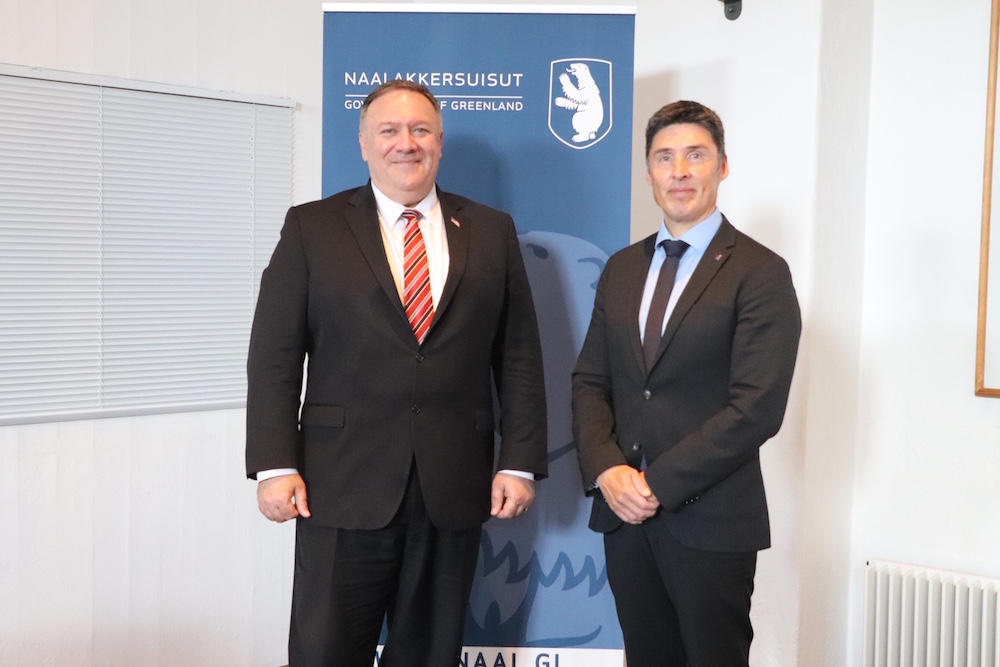In Copenhagen meeting, Pompeo talks up renewed US-Greenland ties
"It’s a new day for the United States and Greenland," the secretary of state said.

Almost a year after his boss called off a trip to Denmark, U.S. Secretary of State Mike Pompeo was in Copenhagen on Wednesday to talk up relations between the two countries, and to tout an American commitment to stand up against Russian and Chinese influence in the Arctic.
During his day-long visit, Pompeo pointed to the re-opening of a U.S. consulate in Nuuk as an element in Washington’s mission to forge a closer alliance with Western allies after, he said, it had stood by while Moscow and Beijing had ramped up their activities in the region.
“Quite simply, it’s a new day for the United States and Greenland. Reopening the U.S. consulate in Nuuk reinvigorates an American presence that was dormant for far too long,” Pompeo said.
With the opening of the consulate in June, Washington now has a diplomat permanently stationed in Greenland, a self-governing country that is a part of the Kingdom of Denmark, for the first time since 1953.
[The US aid package to Greenland marks a new chapter in a long, complex relationship]
Although it was announced before President Donald Trump’s suggestion last year that the U.S. buy Greenland, the opening of the consulate has been a part of a growing effort by Washington to extend its influence there.
Earlier this year, Washington announced it was committing $12.1 million in aid to Greenland, and, during his comments to the press, Pompeo indicated that further collaboration between Greenland and the U.S. would focus on helping it develop areas like mining, energy, fisheries and tourism.
Trump’s suggestion that Washington could buy Greenland rankled many in the former Danish colony that is working towards its independence.
Trump himself cancelled a planned visit to Copenhagen after his suggestion was labelled “absurd” by the Danish prime minister, and both Copenhagen and Nuuk rejected the idea out of hand.
[Greenland welcomes US aid, but some lawmakers fear it could bring entanglements]
Still, some in Greenland see America’s wooing of Greenland as an opportunity for the country to shore up its economy and move itself further out of Copenhagen’s orbit. The opening of the consulate, the aid package and Pompeo’s tone on Wednesday all suggest Washington has made a welcome change of course, according to Steen Lynge, Greenland’s foreign minister.
“What we said in the past and what we do today are two different things. And what matters is what we do and what we say today,” Lynge said after meeting with Pompeo, together with Danish and Faroese foreign ministers.
He said Nuuk welcomes greater U.S. presence in Greenland, but maintained the right to accept investment from all countries, including America’s rivals, something that Washington has managed to put the kibosh on at least twice in the past.
[Greenland lawmakers will consider opening an East Asia office]
One of the key sticking points in the Nuuk-Washington relationship has been the transfer, in 2014, of a lucrative contract providing facilities services at the U.S. Air Force’s Thule Air Base at Pituffik, in far northern Greenland, from a Greenlandic firm to one with U.S. ties. (The base is key to the regional presence of the U.S. Air Force, which announced its first Arctic strategy the previous day.)
Greenlandic lawmakers say the transfer violated, if not the letter, than at least the spirit of an agreement that guarantees that the contract goes to a firm that with ties to Greenland.
Multiple reviews of the transfer have found it was in line with regulations. However, after comments by Lynge yesterday that an agreement about the contract was “the key to a good relationship” between the two countries, Pompeo suggested that Washington was prepared to evaluate how Greenland could benefit “fully” from the U.S. Air Force’s presence in Greenland.